Ducado de Brunsvique-Luneburgo: diferenças entre revisões
| Linha 397: | Linha 397: | ||
|rowspan="2"| Inherited Wolfenbüttel from his father. Joined Wolfenbüttel to his domains in 1485, when he imprisoned his brother.Abdicated to his sons in 1491. |
|rowspan="2"| Inherited Wolfenbüttel from his father. Joined Wolfenbüttel to his domains in 1485, when he imprisoned his brother.Abdicated to his sons in 1491. |
||
|-bgcolor= |
|-bgcolor= |
||
||1485-1491|| [[ |
||1485-1491|| [[Principado de Brunsvique-Volfembutel|Volfembutel]] e [[Principado de Calemberga|Calemberga]] |
||
|-bgcolor=#B3B7FF |
|-bgcolor=#B3B7FF |
||
|[[Philip I, Duke of Brunswick-Grubenhagen|Philip I]] ||[[File:PhilippvonBraunschweigGrubenhagen.JPG|100px]]||1476||1485-1551||4 September 1551||[[Principado de Grubenhagen|Grubenhagen]] (Parte 2 até 1526) || ''Unknown''<br>before 1509<br>one child<br><br>[[Catherine of Mansfeld-Vorderort ]]<br/>c.1510?<br/>nine children|| Son of Albert V, in 1526 reunited Grubenhagen under his hands. |
|[[Philip I, Duke of Brunswick-Grubenhagen|Philip I]] ||[[File:PhilippvonBraunschweigGrubenhagen.JPG|100px]]||1476||1485-1551||4 September 1551||[[Principado de Grubenhagen|Grubenhagen]] (Parte 2 até 1526) || ''Unknown''<br>before 1509<br>one child<br><br>[[Catherine of Mansfeld-Vorderort ]]<br/>c.1510?<br/>nine children|| Son of Albert V, in 1526 reunited Grubenhagen under his hands. |
||
Revisão das 22h36min de 13 de março de 2018
Este artigo ou secção contém uma lista de referências no fim do texto, mas as suas fontes não são claras porque não são citadas no corpo do artigo, o que compromete a confiabilidade das informações. (Agosto de 2013) |
| Ducado de Braunschweig-Lüneburg Ducado de Brunsvique-Luneburgo | ||||
| ||||
|
Brasão
| ||||
 | ||||
| Continente | Europa | |||
| Região | Europa Central | |||
| País | Alemanha | |||
| Capital | Brunsvique, Luneburgo | |||
| Governo | Principado | |||
| História | ||||
| • 1180 1181 |
Henrique, o Leão destituído; Saxônia divido; Henrique reinvestido como Guelfo num Alódio | |||
| • 1235 | Alódio elevado a Ducado de Brunsvique e Luneburgo | |||
| • 1269 de | Partição em Luneburgo e Brunsvique | |||
| • 1291 de | formação do Grubenhagen | |||
| • 1345 de {{{ano_evento3}}} | formação do Gotinga | |||
| • 1432 de {{{ano_evento4}}} | Brunsvique se divide em Volfembutel & Calenberga | |||
| • 1806 | Elevado a Eleitorado | |||
O ducado de Brunsvique-Luneburgo (em alemão Herzogtüm Braunschweig-Lüneburg) foi criado em 1235 a partir dos territórios da Antiga Casa de Guelfo na Saxônia e foi um feudo de Otão I, cujo cognome é Otão, a Criança, um neto de Henrique, o Leão. O nome composto do ducado corresponde às duas maiores cidades do território, Brunsvique e Luneburgo. O ducado foi dividido várias vezes na Alta Idade Média.
Todas as linhas Guelfo detiveram o título de Duque de Brunsvique e Luneburgo. Os principados existiram até o fim do Sacro Império Romano-Germânico, em 1806. Após o Congresso de Viena tornou-se Estado sucessor do Reino de Hanôver e do Ducado de Brunsvique.
História
Em 1180, Henrique, o Leão, recebeu a "proibição imperial", fazendo com que ele perdesse seus títulos de Duque de Saxônia e Duque da Baviera. Ele, então, foi para o exílio por vários anos, mas foi autorizado a permanecer até o fim de sua vida nas propriedades alodiais, herdadas do lado materno.

Em 1235, como parte da reconciliação entre as Casas dos Hohenstaufen e Guelfos, o neto de Henrique, Otão, a Criança, transferiu suas propriedades para o imperador Frederico Barbarossa e foi e enfeoffed (ato pelo qual uma pessoa dava terras em troca de uma promessa de serviço no feudalismo) em troca do ducado recém-criado de Brunsvique-Luneburgo, que foi formado a partir da propriedades transferidas para o imperador, assim como outras grandes áreas do fisco imperial.
Após sua morte em 1252, ele foi sucedido por seus filhos, Alberto e João, que governaram o ducado em conjunto. Em 1269, o ducado foi dividido: Alberto recebeu a parte sul do Estado em torno dos territórios de Brunsvique e João a parte norte na área de Luneburgo. As cidades de Luneburgo e Brunsvique permaneceram na posse total da Casa de Guelfo até 1512 e 1671, respectivamente. Em 1571, o Amt de Calvörde se tornou um enclave do ducado.
As várias partes do ducado foram subdivididas e reunidas ao longo dos séculos, todas elas governadas pelos Guelfos, que mantinham estreitas relações uns com os outros, fenômeno não raro, ao se casarem com primos, uma prática muito mais comum do que é o caso hoje, mesmo entre os camponeses do Sacro Império Romano, com a lei sálica como forma de herança. Tal prática foi incentivada para manter o controle das terras e benefícios. Os assentos do poder mudaram, entretanto, a partir de Brunsvique e Luneburgo para Celle e Volfembutel e as cidades afirmaram sua independência.
História dos principados subordinados
Divisão territorial do Eleitorado de Brunsvique-Luneburgo e as relações dinásticas dentro do Ducado de Brunsvique-Luneburgo e ao Reino da Grã-Bretanha.
A história subsequente do ducado e seus subordinados principados foi caracterizado por numerosas divisões e reagrupamentos. Os estados subordinados que foram repetidamente criados, e que tinham o estatuto jurídico de principados, foram, em geral com o nome da residência de seus governantes. As propriedades das diferentes linhas dinásticas podiam ser herdadas por uma linha de lado quando uma determinada família morria. Por exemplo, ao longo dos séculos, havia o Velho, Casas Médio e Novo (ou linhas) de Brunsvique, e as Casas antigas, Médio e Novo de Luneburgo.
Principado de Brunsvique-Volfembutel
Em 1269, o Principado de Brunsvique foi formado após a primeira divisão do Ducado de Brunsvique-Luneburgo. Em 1432, como resultado da crescente tensão com os habitantes da cidade de Brunsvique, a linha Brunsvique mudou sua residência para Volfembutel em um castelo, enquanto a cidade se desenvolveu em um assento real. O nome Volfembutel foi dado a esse principado. Até 1753/1754 foi a residência oficial, porém voltou para Brunsvique, no recém-construído palácio Brunsvique. Em 1814, o principado tornou-se o Ducado de Brunsvique.
- Principado de Calenberga - Eleitorado depois de Brunsvique-Luneburgo
Em 1432, as propriedades adquiridas pelo Principado de Brunsvique-Volfembutel entre o Deister e o Leine se separaram como o Principado de Calenberga. Ao norte, este novo Estado limitado no Condado de Hoya perto de Niemburgo e ampliado a partir daí em uma estreita, sinuosa linha ao sul com o rio Leine através de Wunstorf e Hanôver onde atingiu o Principado de Volfembutel.
Em 1495, foi ampliado em torno de Gotinga e em 1584 voltou para a linha de Volfembutel. Em 1634, como resultado de distribuições de herança, ele foi à Casa de Luneburgo, antes de se tornar um principado independente novamente em 1635, quando foi dado a Jorge, irmão mais novo do príncipe Ernesto II de Luneburgo, que escolheu Hanôver como sua residência. Novo território foi adicionado em 1665 nos arredores de Grubenhagen e em 1705 em todo o Principado de Luneburgo. Em 1692, o duque Ernesto Augusto, a partir da linha Calenberga, adquiriu o direito de ser um príncipe-eleitor como o príncipe-eleitor de Brunsvique-Luneburgo. Coloquialmente, o eleitorado também era conhecido como o Eleitorado de Hanôver. Em 1814, foi sucedido pelo Reino de Hanôver.
Principado de Luneburgo
O Principado de Luneburgo surgiu junto com o Principado de Brunsvique em 1269 quando a herança do ducado foi dividida. Após a morte do duque Jorge Guilherme de Brunsvique-Luneburgo em 1705, o rei Jorge I da Grã-Bretanha, herdou o estado de Luneburgo com sua esposa, filha do duque, Sofia Doroteia, mais tarde conhecida como a "Princesa do Ahlden". Foi unido com o Principado de Calenberga, que havia sido elevado a eleitorado em 1692.
Principado de Gotinga
O principado mais austral do Ducado de Brunsvique-Luneburgo se estendia desde Münden no sul até o rio Weser para Holzminden. No Oriente, percorreu Gotinga ao longo do rio Leine via Northeim para Einbeck. Ele surgiu em 1345 como resultado de uma divisão do Principado de Brunsvique e estava unido em 1495 com Calenberga.
Principado de Grubenhagen
A partir de 1291-1596 Grubenhagen foi um principado independente, seu primeiro governante foi Henrique, o Admirável, filho do duque Alberto I de Brunsvique-Volfembutel. O Estado laico estendia-se entre a parte norte das colinas Solling e o rio Leine perto de Einbeck e no norte de Eichsfeld e no sudoeste do Harz. Depois de ser dividido ao longo dos anos em principados menores e menores que Grubenhagen, finalmente retornou em 1596 para Brunsvique-Volfembutel.
Outros ramos
Outros ramos que não têm plena soberania existiam no Dannenberg, Harburg, Gifhorn, Bevern, Osterode, Herzberg, Salzderhelden e Einbeck.
Enquanto um total de cerca de uma dúzia de subdivisões que existiam, alguns foram apenas dinásticas e não são reconhecidos como estados do império, que ao mesmo tempo tinha mais de 1500 entidades legalmente reconhecidas. Na lista de participantes do Reichstag (1792), as seguintes quatro subdivisões de Brunsvique-Luneburgo tinham representação:
- O Principado de Luneburgo.
- O Principado de Calenberga - Gotinga, fundiu-se com Eric I de Brunsvique-Volfembutel, em 1495.
- O Principado de Grubenhagen.
- O Principado de Brunsvique-Volfembutel.
Em 1705, apenas dois duques de Brunsvique-Luneburgo sobreviveram, uma decisão de Calenberga, Luneburgo e outros bens, e os outros dirigentes Volfembutel.
De Luneburgo a Hanôver

Uma das linhas dinásticas foi a dos príncipes de Luneburgo, que em 1635 adquiriu Calenberga para Jorge, um membro júnior da família que montou residência na cidade de Hanôver. Seu filho Cristiano Luís e seus irmãos herdaram Celle em 1648 e, posteriormente, compartilhá-la e Calenberga entre si; um ramo intimamente relacionado da família governada separadamente em Volfembutel.
Como um desenvolvimento dos últimos dias, que se tornou o Eleitorado de Hanôver foi chamado inicialmente o eleitor de Brunsvique-Lunenberg quando o imperador nomeou Ernesto Augusto, Duque de Brunsvique-Luneburgo um eleitor em 1696 (dois anos antes de sua morte) em um tanto controverso movimento para aumentar o número de eleitores protestantes, assim, ofendendo os interesses arraigados dos existentes príncipes-eleitores, que já não seriam tão poucos. Como a maioria das questões na Europa durante estes tempos, isso era parte da agitação religiosa de muitos séculos religiosas acompanhadas de guerra aberta (verGuerra dos Trinta Anos) desencadeada pelos defensores zelosos de ambos os lados da Reforma Protestante e da Contrarreforma.
Os territórios da Calenberga e Luneburgo-Celle foram tornados um eleitorado pelo imperador Leopoldo I, em 1692, na expectativa da herança iminente de Celle pelo Duque de Calenberga, embora a união real da dinastia dos territórios não ocorreu até 1705 sob seu filho George Eu Louis, e o eleitorado não foi oficialmente aprovado pela Dieta Imperial até 1708.
O Estado resultante era conhecida sob muitos nomes diferentes (Brunsvique-Luneburgo, Calenberga, Calenberga-Celle; seu governante era frequentemente conhecido como o "eleitor de Hanôver ". Coincidentemente, em 1701, o Duque de Brunsvique-Luneburgo encontrou-se na linha de sucessão para a Coroa Britânica, posteriormente confirmada em 1707 pelo Ato de União, que posteriormente herdou, criando assim uma união pessoal das duas coroas a 20 de outubro de 1714.
Depois de um pouco mais de uma década, o assunto do disputado eleitorado foi resolvido, e o novo Duque de Brunsvique-Luneburgo (nomeado como duque em 23 de janeiro de 1698), George Louis eu era capaz de estilo próprio do eleitor de Brunsvique e Luneburgo de 1708. Não foi apenas acaso, mas semelhante política religiosa provocou a circunstância de ele ser também foi colocado na linha de sucessão à Coroa Britânica pela Lei de Liquidação de 1701 - que foi escrita para assegurar uma sucessão protestante aos tronos da Escócia e Inglaterra no momento em que o sentimento anti-católico era elevado na maior parte do norte da Europa e grande parte da Grã-Bretanha.
No evento, Jorge I sucedeu a seu segundo primo da rainha Ana da Grã-Bretanha - o último membro reinante da Casa de Stuart, e, posteriormente, formaram uma União pessoal de 1 de agosto de 1714 entre a Coroa Britânica e do Ducado de Brunsvique-Luneburgo (Eleitorado de Hanôver), que iria durar até bem depois do final do guerras napoleônicas mais de um século mais tarde, incluindo até mesmo através da dissolução do Sacro Império Romano-Germânico e a ascensão de um novo reino como sucessor. Dessa forma, o "Eleitorado de Hanôver" (o núcleo do ducado) foi ampliado com a adição de outras terras e tornou-se o Reino de Hanôver, em 1814, nas conferências de paz (Congresso de Viena) para resolver o futuro da Europa no pós-guerras napoleônicas .
História da relação com a Coroa Britânica
O primeiro rei hanoveriano da Inglaterra, Jorge I da Grã-Bretanha foi Duque de Brunsvique-Luneburgo, e finalmente foi feito Príncipe-eleitor do Sacro Império Romano-Germânico em 1708. Seus bens foram ampliadas em 1706, quando as terras hereditárias do ramo Calenberga dos Duques de Brunsvique-Luneburgo fundiram-se com as terras do ramo Luneburgo-Celle para formar o Estado de Hanôver. Posteriormente, Jorge I foi nomeado eleitor de Hanôver. Em 1700 e 1701, quando o parlamento inglês tinha abordado a questão de uma sucessão ordenada, com um viés religioso em direção a uma regra protestante, preteriu os filhos da rainha Ana (Casa de Stuart) e, com as disposições da Lei de Liquidação 1701, passou a Sofia de Hanôver, neta de Jaime VI da Escócia e I de Inglaterra. A Grã-Bretanha e Hanôver permaneceram unidos em união pessoal até a ascensão ao trono inglês da rainha Vitória em 1837.
Jorge I foi seguido por seu filho Jorge II e bisneto Jorge III. O último mencionado manteve a posição do eleitor, mesmo depois de o Sacro Império Romano-Germânico foi abolido por seu último imperador em 1806. Jorge III contestou a validade da dissolução do império e manteve escritórios separados consular e pessoal para o Eleitorado de Hanôver até a conferência de paz no final da guerra. Após a queda de Napoleão, Jorge III recuperou suas terras além de terras da Prússia como rei de Hanôver, enquanto abrir mão de alguns outros pequenos territórios dispersos.
Após o Congresso de Viena
Após o fim do Sacro Império Romano-Germânico em 1806, Calenberga-Celle e suas possessões foram adicionados pelo Congresso de Viena ao Reino de Hanôver (incluindo Brunsvique-Luneburgo). Durante a primeira metade do século XIX, o Reino de Hanôver foi governado como união pessoal pela Coroa Britânica sob Jorge III do Reino Unido, o último eleitor de Hanôver até a morte de Guilherme IV em 1837. Nesse ponto, a Coroa de Hanôver foi para o irmão mais novo de Guilherme IV, Ernesto, Duque de Cumberland e Teviotdale sob a lei sálica exigindo que o próximo herdeiro fosse do sexo masculino, enquanto o trono britânico foi herdado pela única filha do irmão mais velho, a rainha Vitória.
Posteriormente, o reino foi perdido em 1866 por seu filho Jorge V de Hanôver durante a Guerra Austro-Prussiana, quando foi anexada pelo Reino da Prússia, e se tornou a província prussiana de Hanôver.
Ducado de Brunsvique
A linha de Volfembutel manteve a sua independência, com exceção de 1807-1813, quando ela e Hanôver foram incorporadas ao napoleônico Reino da Vestfália. O Congresso de Viena, de 1815, transformou-o em um Estado independente sob o nome de Ducado de Brunsvique. O ducado permaneceu independente e juntou-se à primeira Confederação da Alemanha do Norte e em 1871 o então Império Alemão.
Quando a principal linha de descendência se extinguiu em 1885, o imperador alemão tornou-se o legítimo herdeiro, o "Príncipe Herdeiro de Hanôver", e tomou o controle, em vez de instalar um regente. Décadas mais tarde, as famílias foram reconciliados pelo casamento de filho do príncipe herdeiro com a única filha do imperador, e o este permitiu que seu genro assumisse.
Duques de Brunsvique-Luneburgo e sucessores
Casa de Guelfo
Este artigo ou seção está em processo de expansão ou reestruturação durante um curto período. |
Partições do Brunsvique-Luneburgo sob governo Guelfo
| Ducado de Brunsvique-Luneburgo (1235-1269) | |||||||||
| Brunsvique (1269-1291) |
Luneburgo (1ª criação) (1269-1369) | ||||||||
| Grubenhagen (1291-1596) |
Volfembutel (1ª criação) (1291-1292) | ||||||||
| Gotinga (1291-1463) |
Volfembutel (2ª criação) (1344-1400) | ||||||||
| Luneburgo sob governo Ascânio (1373-1388) | |||||||||
| Luneburgo (2ª criação) (1388-1705) | |||||||||
| Volfembutel (3ª criação) (1409-1485) | |||||||||
| Calemberga (1ª criação) (1432-1584) |
|||||||||
| Volfembutel (4ª criação) (1494-1807) | |||||||||
| (Luneburgo anexou Grubenhagen em 1617) | |||||||||
| Calemberga (2ª criação) (1634-1692) Designado Hanôver em 1692 | |||||||||
| Eleitorado de Hanôver (1692-1866) | |||||||||
| Anexado ao Reino de França | |||||||||
| Brunsvique (1813-1918) | |||||||||
| Anexado ao Reino de França | |||||||||
Os governantes
(Nota: Nesta tabela a numeração dos príncipes é a mesma para todos os principados/ducados, uma vez que todos se designaram Duques de Brunsvique-Luneburgo, apesar das diferentes partes de terra e as suas numerações particulares para os governantes. Os príncipes estão aqui numerados pelo ano de ascensão.)
| Governante | Nascimento | Reinado | Morte | Parte | Consorte | Notas | |
|---|---|---|---|---|---|---|---|
| Otão I A Criança |  |
1204 | 1235-1252 | 9 de junho de 1252 | Brunsvique-Luneburgo | Matilde de Brandemburgo 1228 dez filhos |
Neto de Henrique O Leão, fundou o ducado, sendo reconhecido como primeiro duque em 1235, por Frederico II do Sacro Império Romano-Germânico. |
| Alberto I O Alto |  |
1236 | 1252-1269 | 15 de agosto de 1279 | Brunsvique-Luneburgo | Isabel de Brabante 1254 sem filhos Aléxia de Monferrato 1263 sete filhos |
Filhos de Otão I, partilharam o governo até 1269. |
| João I | 1242 | 13 de dezembro de 1277 | Brunsvique-Luneburgo | Lutgarda de Holstein-Itzehoe 1265 cinco filhos | |||
| Todas as linhas da Casa de Guelfo tomaram para si o título de "Duque de Brunsvique-Luneburgo", entre a divisão de 1269 e o fim do Sacro Império Romano-Germânico, em 1806, sendo um título adicional aos que definiam a sua posse territorial (sempre e apenas uma parte do ducado dividido em 1269). Contudo, a tabela percorre as gerações de duques para lá do final do Império, até à deposição do último duque em 1918. | |||||||
| Alberto I O Alto |  |
1236 | 1269-1279 | 15 de agosto de 1279 | Brunsvique | Isabel de Brabante 1254 sem filhos Aléxia de Monferrato 1263 sete filhos |
Em 1269 recebeu o Brunsvique. |
| João I | 1242 | 1269-1277 | 13 de dezembro de 1277 | Luneburgo | Lutgarda de Holstein-Itzehoe 1265 cinco filhos |
Em 1269 recebeu o Luneburgo. | |
| Alberto I O Alto(regente) |  |
1236 | 1277-1279 | 15 de agosto de 1279 | Luneburgo | Isabel de Brabante 1254 sem filhos Aléxia de Monferrato 1263 sete filhos |
Regentes em nome do sobrinho, Otão. |
| Conrado de Brunsvique-Luneburgo, Bispo de Verden (regente) |
Antes de 1277 | 1277-1282 | Depois de 1282 | Luneburgo | Não casou | ||
| Otto II the Strict |  |
1266 | 1282-1330 | 10 April 1330 | Luneburgo | Matilda of Bavaria 1288 five children |
His rule was marked by several feuds, financed by pledges (Verpfändungen), involving border and property disputes with his neighbours. Otto restricted the rights of the knights and safeguarded public order. |
| Henry I the Admirable | August 1267 | 1279-1291 | 7 September 1322 | Brunsvique | Agnes of Meissen 1282 sixteen children |
Sons of Albert I, ruled jointly. In 1291 divided the land: Henry received Grubenhagen, William Wolfenbüttel and Albert Göttingen. William died without descendants, and Albert reunited his land with his brother's. | |
| 1291-1322 | Grubenhagen | ||||||
| William I | 1270 | 1279-1291 | 30 September 1292 | Brunsvique | Elisabeth of Hesse 190 no children | ||
| 1291-1292 | Volfembutel | ||||||
| Albert II the Fat | 1268 | 1279-1291 | 22 September 1318 | Brunsvique | Rixa of Mecklenburg-Werle 1284 ten children | ||
| 1291-1292 | Gotinga | ||||||
| 1292-1318 | Gotinga e Volfembutel | ||||||
| Otto III the Mild | 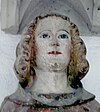 |
24 June 1292 | 1318-1344 | 30 August 1344 | Gotinga e Volfembutel | Judith of Hesse 1311 no children Agnes of Brandenburg-Salzwedel 1319 no children |
Sons of Albert II, ruled jointly. After Otto's death Magnus and Ernest divided the land: Magnus received Wolfenbüttel and Ernest Göttingen. |
| Magnus I the Pious | 1304 | 1318-1344 | 1369 | Gotinga e Volfembutel | Sophia of Brandenburg-Stendal 1327 eight children | ||
| 1344-1369 | Volfembutel | ||||||
| Ernest I | 1305 | 1318-1344 | 24 April 1367 | Gotinga e Volfembutel | Elizabeth of Hesse 1337 three children | ||
| 1344-1367 | Gotinga | ||||||
| Henry II | Before 1296 | 1322-1351 | After 1351 | Grubenhagen | Jutta of Brandenburg-Stendal 1318 four children Helvis of Ibelin 1324 six children |
Sons of Henry I, ruled jointly. | |
| Ernest II | 1297 | 1322-1361 | 9 March 1361 | Grubenhagen | Adelheid of Everstein-Polle June 1335 nine children | ||
| William II | 1298 | 1322-1360 | 1360 | Grubenhagen | Não casou | ||
| John II | Before 1296 | 1322-1325 | After 1367 | Grubenhagen | Não casou | ||
| Otto IV | 1296 | 1330-1352 | 19 August 1352 | Luneburgo | Matilda of Mecklenburg 1311 three children |
Sons of Otto II, ruled jointly. After Otto's death n 1352, William ruled alone. His death without descendants precipitated the Lüneburg War of Succession in 1370. | |
| William III the Elder | 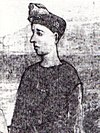 |
c.1300 | 1330-1369 | 23 November 1369 | Luneburgo | Hedwig of Ravensberg 7 April 1328 one child Maria After 1387 one child Sophia of Anhalt-Bernburg 12 March 1346 no children Agnes of Saxe-Lauenburg 1363 no children | |
| Albert III | c.1339 | 1361-1383 | 1383 | Grubenhagen | Agnes of Brunswick-Lüneburg c.1380? one child |
Sons of Ernest II, ruled jointly. John abdicated 1364 to join clergy and Albert became sole ruler. | |
| John II | c.1339 | 1361-1364 | 18 January 1401 | Grubenhagen | Adelheid of Everstein-Polle June 1335 nine children | ||
| Otto V the Evil |  |
1330 | 1367-1394 | 13 November 1394 | Gotinga | Margarethe of Jülich-Berg 1379 two children |
|
| Magnus II of the Necklace (Torquatus) | 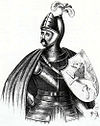 |
1304 | 1369-1373 | 25 July 1373 | Luneburgo e Volfembutel | Katherine of Anhalt-Bernburg 1327 eight children |
Inherited Wolfenbüttel from his father. However, the Lüneburg War of Succession allowed his successionalso in this duchy. However, the War of Succession brought, after his death, the dukes of Saxe-Wittenberg to the government. |
| Frederick I | 1357 | 1373-1400 | 5 June 1400 | Volfembutel | Anna of Saxe-Wittenberg 1386 two children |
Fulfilling the agreement of Hanover, married the daughter of the Duke Wenceslaus of Saxe-Wittenberg. | |
| After the death of Magnus II with the Necklace, a treaty (the Reconciliation of Hanover) was agreed between the widow of Magnus II and her sons and the claimers, Albert of Saxe-Wittenberg and his uncle Duke Wenceslaus I fo Saxe-Wittenberg: the estates of the Principality were to pay homage both to the Welfs and to the Ascanians, and the two noble houses would govern the state alternately. Initially, the land would be given to the two Ascanians from Wittenberg, and after their death it would go to the sons of the fallen Duke Magnus II. After their death, rule of the Principality was to revert to the Ascanians. In order to underpin the agreement, in 1374 Albert of Saxe-Lüneburg married Catharina, the widow of Magnus II. The treaty also envisaged the creation of a statutory body representing the estates, which was to supervise the treaty. However, 1373-1388 would be the only period in which a Brunswick-Luneburg land wasn't ruled by a Welf. | |||||||
| Albert IV (Ascanian) |  |
before 1350 | 1373-1385 | 28 June 1385 | Luneburgo | Katherine of Anhalt-Bernburg 10 November 1373 Hanover 11 July 1374 Celle one child |
Inherited Lüneburg as he was son of Elisabeth, daughter of William the Elder. To reinforce his claim married the widow of the previous duke, Katherine. Albert also moved the residence to Celle after the slighting of Lüneburg Castle. With no male heirs, his co-ruler and uncle, Wenceslaus I of Saxe-Wittenberg, took the entire government of Lüneburg. |
| Wenceslaus I (Ascanian) |  |
1337 | 1373-1388 | 15 May 1388 | Luneburgo | Cecilia da Carrara 23 January 1376 six children |
Took the entire government of the duchy after the death of his nephew, the natural heir. After his death,according to the treaty, the duchy was returned to the Welfs. |
| In the wake of his death, Elector Wenceslas appointed Bernard, his brother-in-law, as co-regent involved him in the government. But his younger brother Henry did not agree with this ruling, and after vain attempts to reach an agreement, the fight flared up again in the spring of 1388. Elector Wenceslas had to assemble an army without the help of Bernard, supported by the town of Lüneburg. From Winsen an der Aller, he wanted to attack Celle, which was held by Henry and his mother. During the preparations, however, Elector Wenceslas fell seriously ill and died shortly thereafter. According to legend, he was poisoned. Lüneburg continued the preparations, formed an alliance with the Bishop of Minden and Count of Schaumburg and set up his own army. On 28 May 1388, battle was joined at Winsen an der Aller; it ended in victory for Henry. According to the provisions of the Treaty of Hanover from the year 1373, after the death of Wensceslas, the Principality passed to the House of Welf. In 1389, a inheritance agreement between the Welfs and the Ascanians was concluded, the treaty of 1374 was abolished, and the Principality was finally secured for the Welfs. | |||||||
| Frederick I, Duke of Brunswick-Osterode (regent) | c.1383 | 1383-1401 | 28 May 1427 | Grubenhagen | Adelaide of Anhalt-Zerbst c.1395? one child |
Brother of Albert III, regent on behalf of his nephew, Eric | |
| Eric I the Winner | c.1383 | 1401-1427 | 28 May 1427 | Grubenhagen | Elisabeth of Brunswick-Göttingen six children |
||
| Henry III the Mild | 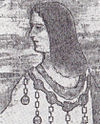
|
1355 | 1388-1400 | 14 October 1416 | Lüneburg | Sophia of Pomerania 11 November 1388 two children Margaret of Hesse 30 January 1409 one child |
Sons of Magnus II, ruled jointly. They permanently recovered Lüneburg for the Welfs. In 1400 inherited Wolfenbüttel and in 1416 divided their lands: Henry retained Lüneburg and Bernard kept Wolfenbüttel until 1428, when exchanged it with Lüneburg from his nephews. |
| 1400-1409 | Luneburgo e Volfembutel | ||||||
| 1409-1416 | Luneburgo | ||||||
| Bernard I | 
|
between 1358 and 1364 | 1388-1400 | 11 June 1434 | Luneburgo | Margaret of Saxe-Wittenberg 1386 three children | |
| 1400-1409 | Luneburgo e Volfembutel | ||||||
| 1409-1428 | Volfembutel | ||||||
| Otto VI the One-Eyed | 1380 | 1394-1463 | 6 February 1463 | Gotinga | Agnes of Hesse 1408 one child |
With no male heirs, after his death Gottingen is absorbed by Calenberg. | |
| William IV the Victorious | 
|
1392 | 1416-1428 | 25 July 1482 | Luneburgo | Cecilia of Brandenburg 30 May/6 June 1423 Berlim two children Matilda of Holstein-Schauenburg-Pinneberg 1466 one child |
Sons of Henry III, ruled jointly. In 1428 they exchanged, with their uncle Bernard I, Lüneburg for Wolfenbüttel. In 1432 founded the Principality of Calenberg, a split-off from Lüneburg, and left the remaining Wolfenbüttel to his brother Henry IV. After the latter's death William took his lands. In 1463, attached the Principado de Gotinga to Calenberg. |
| 1428-1432 | Volfembutel | ||||||
| 1432-1482 | Gotinga e Calemberga | ||||||
| 1473-1482 | Volfembutel | ||||||
| Henry IV the Peaceful | 1411 | 1416-1428 | 7 December 1473 | Luneburgo | Helena of Clèves 1436 one child | ||
| 1428-1473 | Volfembutel | ||||||
| Henry V | 1416 | 1427-1464 | 20 December 1464 | Grubenhagen (Parte 1 desde 1440) | Margaret of Żagań before 27 June 1457 two children |
In 1440 divided Grubenhagen with his brother Albert. | |
| Bernard I |  |
between 1358 and 1364 | 1428-1434 | 11 June 1434 | Luneburgo | Margaret of Saxe-Wittenberg 1386 three children |
In 1428, Bernard recovered Luneburg from his nephews. |
| Otto VII the Lame |  |
? | 1434-1446 | 1446 | Luneburgo | Elisabeth of Eberstein 1425 one child |
Ruled jointly. Their rule was marked by major building work to Celle Castle and also by numerous reforms which improved the legal situation of farmers vis-a-vis their local lords. |
| Frederick II the Pious |  |
1418 | 1434-1457 | 19 March 1478 | Luneburgo | Magdalene of Brandenburg 3 July 1429 Tangermünde three children | |
| Albert V | 1 November 1419 | 1440-1485 | 15 August 1485 | Grubenhagen (Parte 2) | Elisabeth of Waldeck 15 October 1471 two children |
In 1440 Henry V divided Grubenhagen with his brother, Albert. | |
| Bernard II | 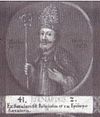 |
1437 | 1457-1464 | 1464 | Luneburgo | Não casou | Also Prince-Bishop of Hildesheim. Ruled jointly with his brother Otto. |
| Otto VIII Magnanimous |  |
1439 | 1457-1471 | 9 January 1471 | Luneburgo | Anna of Nassau-Dillenburg 25 September 1467 Celle two children |
Ruled jointly with his brother Bernard until 1464. |
| Albert V (regent) | 1 November 1419 | 1464-1479 | 15 August 1485 | Grubenhagen (Parte 1) | Elisabeth of Waldeck 15 October 1471 two children |
Appointed regent for his nephew Henry. | |
| Frederick II the Pious |  |
1418 | 1471-1478 | 19 March 1478 | Luneburgo | Magdalene of Brandenburg 3 July 1429 Tangermünde three children |
2nd rule. |
| Henry VI | 1460 | 1479-1526 | 6 December 1526 | Grubenhagen (Parte 1) | Elisabeth of Saxe-Lauenburg 26 August 1494 Einbeck no children |
With his uncle Albert V, officialized the division of Grubenhagen. However, his death without descendants allowed his cousins (sons of Albert) to reunite Grubenhagen. | |
| Anna of Nassau-Dillenburg (regent) |  |
1441 | 1478-1486 | 8 April 1513 | Luneburgo | Otto VIII 25 September 1467 Celle two children Philipp I, Count of Katzenelnbogen 1474 no children |
Regent on behalf of his son after the death of his grandfather. |
| Henry VII the Middle | 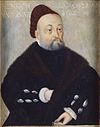 |
15 September 1468 | 1486-1520 | 19 February 1532 | Luneburgo | Margaret of Saxony 27 February 1487 Celle seven children Anna von Camp c.1528? no children |
As he opposed to the newly elected Emperor Charles V, the latter deposed him from the duchy and gave it to his sons. |
| Frederick III the Turbulent | 1424 | 1482-1485 | 7 July 1503 | Calemberga | Anna of Brunswick-Grubenhagen-Einbeck After 1460 no children Margaret of Rietberg 10 May 1483 no children |
Imprisoned by his brother William, who took his place. | |
| William V the Younger | 
|
1425 | 1482-1485 | 7 July 1503 | Volfembutel | Elizabeth of Stolberg-Wernigerode 1444 three children |
Inherited Wolfenbüttel from his father. Joined Wolfenbüttel to his domains in 1485, when he imprisoned his brother.Abdicated to his sons in 1491. |
| 1485-1491 | Volfembutel e Calemberga | ||||||
| Philip I | 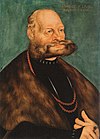 |
1476 | 1485-1551 | 4 September 1551 | Grubenhagen (Parte 2 até 1526) | Unknown before 1509 one child Catherine of Mansfeld-Vorderort c.1510? nine children |
Son of Albert V, in 1526 reunited Grubenhagen under his hands. |
| Henry VIII the Elder | 14 June 1463 | 1491-1494 | 23 June 1514 | Volfembutel e Calemberga | Catherine of Pomerania-Wolgast 1486 nine children |
Sons of William V, ruled jointly. In 1494, they divided their lands. Henry retained Wolfenbüttel and Eric retained Calenberg. | |
| 1494-1514 | Volfembutel | ||||||
| Eric II the Elder | 
|
16 February 1470 | 1491-1494 | 30 July 1540 | Volfembutel e Calemberga | Katharina of Saxony 1496/7 no children Elisabeth of Brandenburg 7 July 1525 Stettin four children | |
| 1494-1540 | Calemberga | ||||||
| Henry IX the Younger |  |
10 November 1489 | 1514-1568 | 11 June 1568 | Volfembutel | Maria of Württemberg 1515 eight children Sophia of Poland 22/25 February 1556 no children |
He was the last Catholic of his family. Under him the medieval fortress (Burg) was rebuilt into a castle (Schloss); he was a passionate opponent of the Lutherans, and driving force behind the Catholic alliance established against the Schmalkaldic League; the disinheritance of a third son could not be carried out. |
| Otto IX |  |
24 August 1495 | 1520-1527 | 11 August 1549 | Luneburgo | Meta von Camp 1527 no children |
Sons of Henry VII, ruled jointly. Otto abdicated in 1527 and founded his own estate, the Lordship of Harburg, which passed to his own descendants. Ernest was a champion of the Protestant cause during the early years of the Protestant Reformation. Francis strated his co-rulership in 1536, and abdicated three years later to rule in his own estate, the Principality of Gifhorn, which was reannexed to Lüneburg after his death as he left no descendants. |
| Ernest III the Confessor |  |
27 June 1497 | 1520-1546 | 11 January 1546 | Luneburgo | Sophia of Mecklenburg-Schwerin 2 June 1528 Schwerin seven children | |
| Francis I |  |
23 November 1508 | 1536-1539 | 23 November 1549 | Luneburgo | Clara of Saxe-Lauenburg 29 September 1547 Amt Neuhaus seven children | |
| Governo interino: 1546-1555 | |||||||
| Elisabeth of Brandenburg (regent) |  |
24 August 1510 | 1540-1545 | 25 May 1558 | Calemberga | Eric II the Elder 7 July 1525 Stettin four children Poppo XII of Henneberg 1546 no children |
Regent on behalf of her son, Eric. Called The Reformation Princess, implemented the Reformation in Calenberg. She also wrote a "government manual" for Eric II, with important advice that should serve him as a guide. |
| Philip I, Landgrave of Hesse (regent) | 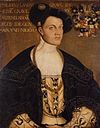 |
13 November 1504 | 31 March 1567 | Calemberga | Christine of Saxony 11 December 1523 Dresden ten children Margarethe von der Saale 4 March 1540 (morganatic and bigamous) nine children |
Regent on behalf of Eric III. | |
| Eric III | 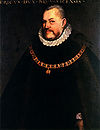 |
10 August 1528 | 1545-1584 | 17 November 1584 | Calemberga | Sidonie of Saxony 17 May 1545 Hann. Münden no children Dorothea of Lorraine 26 November 1575 Nancy no children |
Left no descendants, and Calenberg was annexed to Wolfenbüttel. |
| Ernest IV |  |
17 December 1518 | 1551-1567 | 2 April 1567 | Grubenhagen | Margaret of Pomerania-Wolgast 9 October 1547 Wolgast one child |
Left no male descendants. The land passed to his brother Wolfgang. |
| Francis Otto |  |
20 June 1530 | 1555-1559 | 29 April 1559 | Luneburgo | Elizabeth Magdalene of Brandenburg 1559 no children |
Left no descendants. The land passed to his brothers. |
| Henry X | 1533 | 1559-1569 | 19 January 1598 | Luneburgo | Ursula of Saxe-Lauenburg 1569 seven children |
Brothers of Francis Otto, ruled jointly. In 1569 Henry founded the duchy of Dannenberg, which left to his own descendants. William ruled alone from 1569. | |
| William VI the Younger |  |
4 July 1535 | 1559-1592 | 20 August 1592 | Luneburgo | Dorothea of Denmark 12 October 1561 fifteen children | |
| Wolfgang | 6 April 1531 | 1567-1595 | 14 May 1595 | Grubenhagen | Dorothea of Saxe-Lauenburg 10 December 1570 Osterode am Harz no children |
Like most of his predecessors, he had financial problems, so he was often forced to sell or pledge major parts of his possession and he had to demand high taxes. As he left no male descendants, the land passed to his brother Philip. | |
| Julius | 
|
29 June 1528 | 1568-1584 | 3 May 1589 | Volfembutel | Hedwig of Brandenburg 25 February 1560 Cölln eleven children |
In 1584 absorbes the Principality of Calenberg. By embracing the Protestant Reformation, establishing the University of Helmstedt, and introducing a series of administrative reforms, Julius was one of the most important Brunswick dukes in the early modern era. |
| 1584-1589 | Volfembutel e Calemberga | ||||||
| Henry Julius |  |
15 October 1564 | 1589-1596 | 30 July 1613 | Volfembutel e Calemberga | Dorothea of Saxony 26 September 1585 Volfembutel one child Elizabeth of Denmark 19 April 1590 Cölln ten children |
In 1596 occupied Grubenhagen. |
| Ernest V | 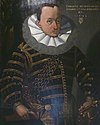 |
31 December 1564 | 1592-1611 | 2 March 1611 | Luneburgo | Não casou | Left no descendants. The land passed to his brother, Christian. |
| Philip II | 2 May 1533 | 1595-1596 | 4 April 1596 | Grubenhagen | Clara of Brunswick-Wolfenbüttel 1 July 1560 Volfembutel no children |
As he left no male descendants, the land had no heir and was occupied by the Principality of Wolfenbüttel. | |
| Henry Julius |  |
15 October 1564 | 1596-1613 | 30 July 1613 | Volfembutel, Calemberga eGrubenhagen | Dorothea of Saxony 26 September 1585 Volfembutel one child Elizabeth of Denmark 19 April 1590 Cölln ten children |
|
| Christian the Elder |  |
9 November 1566 | 1611-1617 | 8 November 1633 | Luneburgo | Não casou | In 1617 annexed Grubenhagen to his domains |
| Frederick Ulrich |  |
5 April 1591 | 1613-1616 | 11 August 1634 | Volfembutel, Calemberga eGrubenhagen | Anna Sophia of Brandenburg 4 September 1614 Volfembutel no children |
Because of his alcoholism, was deposed by his own mother, who ttok the regency in his name. |
| Elizabeth of Denmark (regent) |  |
25 August 1573 | 1616-1622 | 19 July 1625 | Volfembutel, Calemberga eGrubenhagen | Henry Julius 19 April 1590 Cölln ten children |
With the help of her brother, Christian IV of Denmark, she managed to depose her son, as he was alcoholic and at that point unfit for ruling. However she lost in 1617 the Principality of Grubenhagen. Left the government business for Anton von Streithorst, who nearly ruined the state by minting coins from cheap metals and thus causing inflation. Because of the bad situation of the state, the king of Denmark had Frederick take control of the government again. |
| Christian the Elder |  |
9 November 1566 | 1617-1633 | 8 November 1633 | Luneburgo e Grubenhagen | Não casou | Absorbed Grubenhagen from Wolfenbüttel. As he left no descendants, the land passed to his brother, Augustus. Grubenhagen is definitively annexed to Lüneburg. |
| Frederick Ulrich |  |
5 April 1591 | 1622-1634 | 11 August 1634 | Volfembutel eCalemberga | Anna Sophia of Brandenburg 4 September 1614 Volfembutel no children |
Left no descendants. His lands passed to collateral lines of the Lüneburg Welfs. |
| Augustus I the Elder |  |
18 November 1568 | 1633-1636 | 1 October 1636 | Luneburgo (e Grubenhagen) | Não casou | As he left no descendants, the land passed to his brother, Frederick IV. |
| George I | 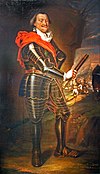 |
17 February 1582 | 1634-1641 | 12 April 1670 | Calemberga | Anne Eleonore of Hesse-Darmstadt 14 December 1617 Darmstadt eight children |
Younger son of William VI. Inherited Calenberg from his cousin Frederick Ulrich, who had left no descendants. Abdicated to his son in 1641. |
| Augustus II the Younger |  |
10 April 1579 | 1634-1666 | 17 September 1666 | Volfembutel | Clara Maria of Pomerania-Barth 13 December 1607 Strelitz two children Dorothea of Anhalt-Zerbst 26 October 1623 Zerbst five children Elisabeth Sophie of Mecklenburg 1635 two children |
Younger son of Henry X. Inherited Wolfenbüttel from his cousin Frederick Ulrich, who had left no descendants. In 1643 he moved into the Residence at Wolfenbüttel, was the founder of a barock theatre and the Bibliotheca Augusta. |
| Frederick IV |  |
28 August 1574 | 1636-1648 | 10 December 1648 | Luneburgo (e Grubenhagen) | Não casou | As he left no descendants, the land had no heir, and passed to a nephew, Christian Louis, son of Frederick's brother George. |
| Christian Louis | 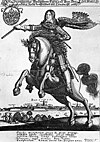
|
25 February 1622 | 1641-1648 | 15 March 1665 | Calemberga | Sophia Dorothea of Schleswig-Holstein-Sonderburg-Glücksburg 9 October 1653 no children |
Abdicated for his brother, to take the inheritance of his uncle in Lüneburg. |
| 1648-1665 | Luneburgo | ||||||
| George William | 
|
26 January 1624 | 1648-1665 | 28 August 1705 | Calemberga | Éléonore Desmier d'Olbreuse 1676 one child |
Abdicated for his brother, to take the inheritance of his other brother in Lüneburg. At his death without male descendants, the land passed to his son-im-law, the Elector of Hanover. Lüneburg is annexed to Hanover. |
| 1665-1705 | Luneburgo | ||||||
| Rudolf Augustus |  |
16 May 1627 | 1666-1704 | 26 January 1704 | Volfembutel | Christiane Elizabeth of Barby-Mühlingen 1650 three children Rosine Elisabeth Menthe 1681 (morganatic) no children |
Sons of Augustus II, ruled jointly from 1685 to 1702. According to reports dating to 1677, Rudolf Augustus slashed a way through the Lechlum Forest, the Alten Weg ("Old Way"), later the "Barock Road" between the Lustschloss of Antoinettenruh via the little barock castle [later the Sternhaus] to the Großes Weghaus at Stöckheim; in 1671 captured the town and fortress of Brunswick. After the death of Rudolf Augustus, Anthony Ulrich returned to the throne and ruled alone. A politician, art lover and poet, he founded a museum named after him in Brunswick; he had also Salzdahlum Castle built. |
| Anthony Ulrich |  |
4 October 1633 | 1685-1702 1704-1714 |
27 March 1714 | Volfembutel | Elizabeth Juliana of Schleswig-Holstein-Sønderburg-Nordborg 17 August 1656 thirteen children | |
| John Frederick |  |
25 April 1625 | 1665-1679 | 18 December 1679 | Calemberga | Benedicta Henrietta of the Palatinate 30 November 1668 Hanover three children |
Brother of Christian Louis and George William. As he left no male heirs, the land passed to his younge brother, Ernest Augustus. |
| Ernest Augustus I | 
|
20 November 1629 | 1679-1692 | 23 January 1698 | Calemberga | Sophia of the Palatinate 30 September 1658 Heidelberg seven children |
Youngest son of George I. Brother of Christian Louis, George William and John Frederick. In 1692, he was appointed Prince-elector by Leopold I, Holy Roman Emperor, thus raising the House of Welf to electoral dignity. The old Principality of Calenberg thus adopted the new name of Electorate of Hanover. |
| 1692-1698 | Eleitorado de Hanôver | ||||||
| George II Louis | 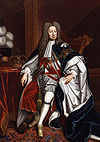
|
28 May 1660 | 1698-1705 | 11 June 1727 | Eleitorado de Hanôver | Sophia Dorothea of Brunswick-Lüneburg 22 November 1682 Celle (annulled 1694) two children |
The electorship became effective under his rule. In 1705 reunited his father-in-law's princedom of Lüneburg to the Electorate. In 1714 was chosen for King of Great Britain, starting a personal union between Hanover and this new country. Lüneburg was definitely annexed to the Electorate. Thus the Wolfenbüttel was the remaining old land of Brunswick-Lüneburg that remained separate. Usually numbered I as Elector and King of Great Britain. |
| 1705-1727 | Eleitorado de Hanôver e Luneburgo | ||||||
| Augustus William |  |
8 March 1662 | 1714-1731 | 23 March 1731 | Volfembutel | Christine Sophie of Brunswick-Wolfenbüttel 1681 no children Sophie Amalie of Holstein-Gottorp 1695 no children Elisabeth Sophie Marie of Schleswig-Holstein-Sonderborg-Norburg 1710 no children |
Son of Anthony Ulrich. Ruler of the only land who wasn't still in Hanoverian lands, to which it would never belong. |
| George III Augustus |  |
30 October / 9 November 1683O.S./N.S. | 1727-1760 | 25 October 1760 | Eleitorado de Hanôver | Wilhelmina Charlotte Caroline of Brandenburg-Ansbach 22 August / 2 September 1705O.S./N.S. Hanover ten children |
In personal union with Great Britain. Usually numbered II as Elector and King of Great Britain. |
| Louis Rudolph |  |
22 July 1671 | 1731-1735 | 1 March 1735 | Volfembutel | Christine Louise of Oettingen-Oettingen 22 April 1690 Aurich three children |
Left no male heirs, and his land passed to a collateral line. |
| Ferdinand Albert | 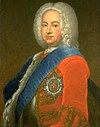 |
29 May 1680 | 1735 | 2 September 1735 | Volfembutel | Antoinette Amalie of Brunswick-Wolfenbüttel 15 October 1712 Brunswick thirteen children |
From the line of Brunswick-Bevern. Grandson of Augustus II. |
| Charles I |  |
1 August 1713 | 1735-1773 | 26 March 1780 | Volfembutel | Philippine Charlotte of Prussia 2 June 1733 Berlim thirteen children |
Founder of the Collegium Carolinum in Brunswick, the porcelain makers of Fürstenberg, the fire office; in 1753 the Residence was moved to Brunswick. |
| George IV William Frederick |  |
4 June 1738 | 1760-1811 | 29 January 1820 | Eleitorado de Hanôver | Charlotte of Mecklenburg-Strelitz 8 September 1761 Londres fifteen children |
In personal union with Great Britain. Usually numbered III as Elector and King of Great Britain. Born in England, never visited Hanover. |
| Charles II William Ferdinand | 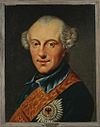 |
9 October 1735 | 1773-1806 | 10 November 1806 | Volfembutel | Augusta of Great Britain 16 January 1764 Londres seven children |
Due to financial problems, was obliged to replace his father. He was the head of the Prussian Army; died in the Battle of Jena; because his son and heir died young, and two other sons were not eligible, rule passed to his youngest son. |
| With the dissolution of the Holy Roman Empire in 1806, the title of Duke of Brunswick-Lüneburg ceased to exist. However, its successor states continued. | |||||||
| Frederick William the Black Duke |  |
9 October 1771 | 1806-1807 | 16 June 1815 | Volfembutel | Marie Elisabeth Wilhelmine of Baden 1 November 1802 Karlsruhe three children |
Duke of Oels/Silesia, the "Black Duke"; recruited a Freikorps (volunteer corps), the Black Brunswickers, at the outbreak of the War of the Fifth Coalition in Bohemia in 1809, and made his way via Brunswick to the North Sea and then on to Great Britain. |
| On the Eve of Napoleonic era, in 1807 the Duchy was briefly annexed to the Kingdom of France, to appear again in 1813 as Duchy of Brunswick. | |||||||
| George V Augustus Frederick | 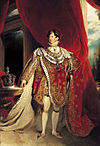 |
12 August 1762 | 1811-1830 | 26 June 1830 | Eleitorado de Hanôver (até 1814) Reino de Hanôver (a partir de 1814) |
Caroline Amelia Elizabeth of Brunswick-Wolfenbüttel 8 April 1795 Londres one child |
In personal union with Great Britain. Named regent of his father due to his illness, succeeding him after his death in 1820. Usually numbered IV as King of Hanover and Great Britain. Left no male descendants. The land passed to his brother. |
| Frederick William the Black Duke |  |
9 October 1771 | 1813-1815 | 16 June 1815 | Brunsvique | Marie Elisabeth Wilhelmine of Baden 1 November 1802 Karlsruhe three children |
Restored to his duchy. |
| George IV of Great Britain (regent) |  |
12 August 1762 | 1815-1823 | 26 June 1830 | Brunsvique | Caroline Amelia Elizabeth of Brunswick-Wolfenbüttel 8 April 1795 Londres one child |
Regent on behalf of the Duke of Brunswick, Charles. |
| Charles III | File:Charles II, Duke of Brunswick-Lüneburg (1804-1873).jpg | 30 October 1804 | 1815-1830 | 18 August 1873 | Brunsvique | Não casou | On the eve of July Revolution of 1830, Charles was in Paris, and didn't manage to keep the duchy for himself; his brother William took over with the agreement of the people and his international neighbours. |
| William VII Henry |  |
21 August 1765 | 1830-1837 | 20 June 1837 | Reino de Hanôver | Adelaide of Saxe-Meiningen 13 July 1818 Londres four children |
In personal union with Great Britain. Usually numbered IV as King of Hanover and Great Britain. As he left no descendanrs, the land passed to his brother. |
| William VIII |  |
25 April 1806 | 1830-1884 | 18 October 1884 | Brunsvique | Não casou | |
| Ernest Augustus II |  |
5 June 1771 | 1837-1851 | 18 November 1851 | Reino de Hanôver | Frederica of Mecklenburg-Strelitz 29 May 1815 Neustrelitz three children |
End of personal union with Great Britain, as in this country the successor in 1837 was Queen Victoria (in Hanover the Salic Law was still active). |
| George VI Frederick | 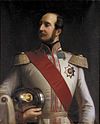 |
27 May 1819 | 1851-1866 | 12 June 1878 | Reino de Hanôver | Marie of Saxe-Altenburg (I) 18 February 1843 Hanover three children |
Usually numbered V as King of Hanover. He was the last king of Hanover, as his reign ended with the Unification of Germany. |
| Albert of Prussia (regent) |  |
8 May 1837 | 1885-1906 | 13 September 1906 | Brunsvique | Marie of Saxe-Altenburg (II) 9 April 1873 Berlim three children |
|
| John Albert of Mecklenburg-Schwerin (regent) | File:Johann-Albrecht-zu-Mecklenburg.jpg | 8 December 1857 | 1906-1913 | 20 February 1920 | Brunsvique | Elisabeth Sybille of Saxe-Weimar-Eisenach 6 November 1886 Weimar no children Elisabeth of Stolberg-Rossla 15 December 1909 no children |
The regency came to an end on 1 November 1913 when Ernest Augustus, Crown Prince of Hanover's son Ernest Augustus was permitted to ascend to Duchy following his marriage to Princess Victoria Louise of Prussia |
| Ernest Augustus III | File:Ernst August Herzog zu Braunschweig.jpg | 17 November 1887 | 1913-1918 | 30 January 1953 | Brunsvique | Victoria Louise of Prussia 24 May 1913 Berlim five children |
In 1918, with the abolition of the monarchy, all nobles titles were equally abolished. |
Bibliografia
(em português) http://www.dec.ufcg.edu.br/biografias/RBDHnovr.html

